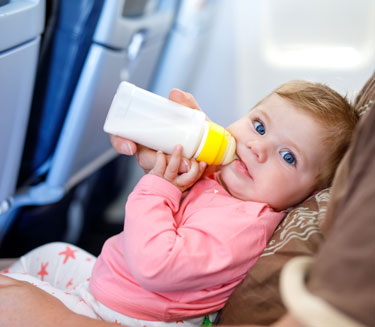Family Travel: Less Stress = More Fun!

In a recent blog on Huffington Post, the author asked the question "Vacation or Trip?"
We tend to use these words interchangeably; however, have you come back from a family "vacation" stressed and tired rather than refreshed? Then, according to the author, you probably took a trip.
Family trips can be stressful for lots of reasons. They can be expensive, even when you try to be frugal. They often involve long car rides, cramped hotel rooms or condos, tired children and adults, family members you don't often interact with, and maybe a little too much togetherness. While this is unlikely to change, especially if you have young children, a little planning and keeping expectations realistic can help make the trip less stressful, and maybe, just maybe, get you a little closer to a vacation.
Why are you traveling?
Are you going to a family reunion? Do you want to get away from home for a bit? Are you hoping to expose your kids to different places?
Keeping your purpose in mind will help you keep your expectations realistic. One of the main reasons we become disappointed or stressed is when an outcome or process violates our expectations. So, go into family travel with the understanding that everything will not be perfect. It may rain. Someone may throw up. There may be a meltdown or five during the trip (and they may not all be from the kids).
If you and the other adults involved go into the trip or vacation with some flexibility, your expectations are less likely to be violated, and you are less likely to be stressed or disappointed when things inevitably don't go as planned.
What are your goals?
What is your plan for the trip? Are you hoping to relax and get away from the daily grind? Do you have very young children?
If the answer to both of these questions is yes, it may be helpful to keep those expectations in mind. If you are traveling with young children, it will be very difficult to relax unless you are also traveling with other adults such as grandparents or a babysitter who can take over the supervisory duties so you have a chance to do some relaxing.
Are you hoping to expose your children to new places and people?
Be sure to plan outings that offer those opportunities. Some preplanning such as checking to see when museums or other facilities are open and how much they cost can go a long way in reducing the stress of being in a new place. If you have a child who likes to know what is going on (like I do), let them help you with the planning and research so they know what to expect. Many cities have websites and other resources available with lists of family friendly activities such as free or low-cost places to visit and things to do.
What is your budget?
One of the ways to reduce the stress of travel is to set a budget and stick to it. If you are worried about money the entire trip, you will not be able to enjoy yourself, and you will likely share your stress with everyone else, including your children.
Give kids a specific amount of money to spend on souvenirs rather than buying them something everywhere you go. If they know they have $20 to spend, they are more likely to be picky about what they spend it on.
Look for activities and dining that help you stay within your budget. Consider picnicking, eating breakfast at your hotel if it is included, or, if you have access to a kitchen, cooking at least one meal each day.
Another Consideration is Your Space
Give yourselves enough room (if it is in your budget). Nothing is more stressful on a trip than tripping over each other the whole time. If it is within your budget, get adjoining hotel rooms, a suite, or a condo, especially if you are traveling with multiple children.
Giving yourselves room to spread out can take the pressure off of everyone. If you, your partner, or your kids are introverts, having this extra space can make a huge difference in how enjoyable a trip you can have.
BUT...and this is a big but...don't overtax your budget. It may be worth staying a shorter time or limiting dining out in order to give yourselves more space, but you may prefer spending your funds on dining or entertainment and having less space. Setting these priorities in advance can help with maintaining realistic expectations.
Dr. Laura Hendrix, UAEX Resource Management Specialist, offers some great budgeting tips on her UAEX Money blog.
How are you getting there?
Driving?
 Pack snacks in individual containers for each kid. This simple trick can reduce the
amount of time you spend policing snacking and responding to cries of "I'm hungry!"
Pack snacks in individual containers for each kid. This simple trick can reduce the
amount of time you spend policing snacking and responding to cries of "I'm hungry!"
Bring car games. The License Plate Game is a favorite on family trips for us. There are even apps that can help you keep track! Listen to podcasts, audiobooks, or read books aloud. It is tempting to give kids phones, tablets, or other screens to keep them occupied the entire trip, but it can cause problems with some kids such as carsickness or overstimulation, so keep screen time in check. There are quite a few wonderful podcasts that are engaging and entertaining for kids of all ages, and these are generally free to download and listen to.
Do you have kids or adults who get carsick? Be sure to prepare. Bring sick bags, give them medicine such as Bonine or Dramamine before leaving or put sea bands on their wrists. It is also helpful to learn their tells. Most older kids and adults will know it is coming, but a young child can misinterpret their nausea for hunger or some other feeling. For example, my middle daughter always said she was hungry and thirsty before she would inevitably be sick. It took us a few times before we realized this. Keeping them cool, engaged in conversation or other activity, or encouraging them to sleep can help avoid sickness.
Allow for frequent stops (especially with young kids), and try to give kids a chance to run around when you stop by choosing a park for a picnic lunch or stopping somewhere with a playground. Pack the potty seat if you have a potty training child. Consider traveling overnight if your kids will sleep in the car.
Be sure your children are traveling safely by stressing to them the importance of staying in their seatbelts and car seats. It is incredibly important to keep everyone safely strapped into an appropriate restraint. The American Academy of Pediatrics has recently updated their recommendations for car seats, and most states have primary laws for carseat and seatbelt use for minors meaning that you can be pulled over just for having an unbuckled child in the car.
Flying?
 Be sure to arrive at the airport early enough to avoid rushing. Rushing is very stressful for kids, and it is almost impossible. Check airline regulations regarding car seats and strollers before heading to the airport so you know whether
you will have to check these items or be allowed to check them at the gate or put
them on the plane. In most cases, things like snacks must be purchased once you make
it through security; however, you may be allowed to bring homemade items in your carryon
bag if you allow them to go through the x-ray machine.
Be sure to arrive at the airport early enough to avoid rushing. Rushing is very stressful for kids, and it is almost impossible. Check airline regulations regarding car seats and strollers before heading to the airport so you know whether
you will have to check these items or be allowed to check them at the gate or put
them on the plane. In most cases, things like snacks must be purchased once you make
it through security; however, you may be allowed to bring homemade items in your carryon
bag if you allow them to go through the x-ray machine.
Items such as breast milk or formula are allowed to be brought on a plane if you have a baby traveling with you. If you are traveling without the baby but need to pump milk while away, be sure to familiarize yourself with TSA policies. You have the right to bring the milk back with you, but there have been several reported issues in airports nationwide.
Be sure to plan for transportation once you arrive. If you have kids in car seats, familiarize yourself with policies in the city you are visiting, especially if you plan to use mass transit or cabs rather than renting a vehicle.
So, is it a vacation or a trip?
More than likely, you are taking a trip if you are taking young children or going for the express purpose of visiting family; however, some planning and preparation can help your trip be less stressful and more like a vacation. Do your best to relax and enjoy!
For more information:
AAP Recommendations for Car Seats
UAEX Family Travel Pinterest Board
UAEX Money Vacation Spending Tips